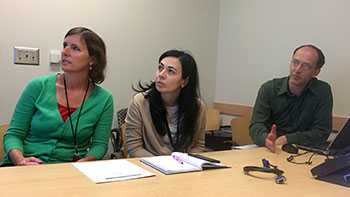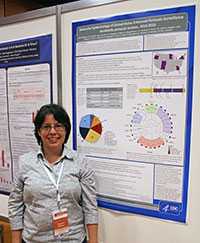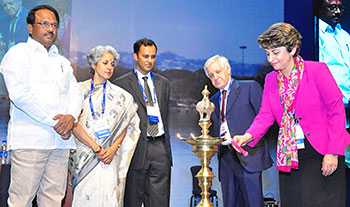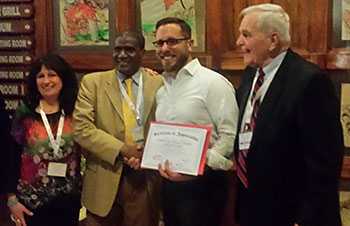Division of Bacterial Diseases (DBD) News Bulletin
Summer 2016, Issue 18

Photo: DBD’s Lesley McGee and Sopio Chochua, microbiologists in the Streptococcus Laboratory, and Adam Retchless, Bacterial Meningitis Laboratory health scientist, present an overview of whole genome sequencing efforts during an April webinar with the Association of Public Health Laboratories.
In This Issue
Meetings and Presentation Highlights
Vaccine-Preventable Diseases Reference Center Stakeholders Meeting
During May 10–11, several staff from across NCIRD participated in the Association of Public Health Laboratories (APHL) Vaccine Preventable Diseases (VPD) Reference Center Stakeholders meeting at the Emory Conference Center. DBD staff, including Stephen Hadler, Lucia Pawloski, Adam Retchless, Srini Velusamy, Michael Weigand, and Brunie White, presented on various topics from pertussis serology testing to Next Generation Sequencing. In collaboration with APHL and CDC, The Reference Centers were established in 2013 to sustain testing services capacity for a broad range of VPDs at selected state public health laboratories. Meeting participants discussed and evaluated successes and challenges over the past three years and considered future priorities.
Association of Public Health Laboratories Webinar
The April 21 Association of Public Health Laboratories webinar discussed whole genome sequencing (WGS) of bacterial pathogens. DBD laboratory scientists Lesley McGee, Brian Raphael, and Adam Retchless presented an overview of the WGS work being conducted in the Streptococcus, Legionella, and Bacterial Meningitis Laboratories.

Photo: DBD microbiologist, Margaret Williams, presented her poster at the April 2016 11th Annual International Bordetella Symposium.
11th Annual International Bordetella Symposium
DBD staff made significant contributions to the science presented at the 11th Annual International Bordetella Symposium April 5–8 in Buenos Aires, Argentina. Important issues related to Bordetella molecular biology, evolution, infection, pathology, immunity, vaccinology, epidemiology, and other topics were presented. Anna Acosta presented the poster "Acellular pertussis vaccine effectiveness among children and adolescents in the setting of pertactin-deficient pertussis, Vermont, 2011–2013." Katie Bowden presented the poster "Complete genome analysis of 31 Bordetella pertussis isolates from two U.S. pertussis statewide epidemics: California 2010 and Vermont 2012." Pam Cassiday presented the poster "Screening for azithromycin and erythromycin resistance among U.S. isolates of Bordetella pertussis, 2012–2015." Temi Folaranmi presented the poster "Systematic review of pertussis in Latin America: 1980–2014." Connie Lam presented the poster "Transcriptional differences in Bordetella pertussis strains not expressing vaccine antigens." Han Li presented the poster "Development of a functional assay to measure antibody neutralization activity to Bordetella pertussis Adenylate Cyclase Toxin." Lucia Pawloski presented the poster "A qualitative capture ELISA on an electrochemiluminescent platform: An alternative method to screening for the production of Bordetella pertussis vaccine immunogens." Scott Peng presented the poster "Whole genome sequencing and single nucleotide polymorphism analysis of 434 Bordetella pertussis isolates using de novo assembly pipeline." Shankar Rajam presented the poster "Development of a multiplex serological assay to measure the immune response to pertussis antigens." Tami Skoff presented the poster "The impact of the U.S. maternal Tdap vaccination program on preventing infant pertussis." Heidi Soeters presented the poster "Epidemiology of pertussis in Panama, 2003–2014." Lucia Tondella presented "Latin American Pertussis Projects: Successes and challenges" and co-chaired the session on Bordetella biology, genomics, and evolution. Michael Weigand presented "Bordetella genomics and evolution: A history of genome structural fluidity during the resurgence of Bordetella pertussis in the United States." Margaret Williams presented the poster "Molecular epidemiology of Bordetella pertussis isolates from the U.S. enhanced pertussis surveillance project, 2010–2015." Other DBD participants included Steve Hadler, Stacey Martin, and Jarad Schiffer.
Board of Scientific Counselors Meeting, Office of Infectious Diseases, CDC
RDB branch chief, Cynthia Whitney, presented on NCIRD’s efforts in CDC’s Flint, Michigan, water crisis response, specifically on Legionella, at the March 28 Atlanta meeting of the CDC Board of Scientific Counselors.
Annual Quality Management Systems Management Review
NCIRD hosted its annual Quality Management Systems management review on March 14. DBD’s quality manager, Genevieve Langley, presented successes of the past year, including the replacement of 76 outdated pieces of laboratory equipment to improve safety and save energy costs and on the development of a personnel tracker (training database). The personnel tracker assigns training and document requirements to roles, groups, and teams, creates reports of pending and completed trainings, and notifies staff of pending or past due requirements.
Top of Page17th International Congress on Infectious Diseases
This year marked the first time the International Congress on Infectious Diseases (March 2–5) was held in India. More than 2,000 health and disease experts from 120 countries gathered in Hyderabad for the Congress. A broad roster of scientific sessions encompassed all aspects of infectious diseases with particular attention being paid to the major challenges in the South Asia region—HIV, tuberculosis, pneumonia, enteric infections, antimicrobial resistance, typhoid fever, and diarrhea—and focused on disease prevention and vaccination.
DBD director, Rana Hajjeh, general secretary of the International Society for Infectious Diseases, was a member of the International Organizing Committee for the Congress and chaired sessions on cautious antibiotic use as well as infection control practices in developing countries. She also gave a lecture on lessons learned from the introduction of Hib vaccines and implications for other new vaccines.

Photo: DBD director, Rana Hajjeh (far right), at the Lamp Lighting Ceremony by Shri for the official opening of the 17th International Congress on Infectious Diseases (ISID) in Hyderabad, India March 2016. Hajjeh, who serves as general secretary for the Society is joined by (L to R) Charlakola Laxma Reddy Garu–the Honorable Minister for Health, Medical and Family Welfare, Government of Telangana in presence of Dr. Soumya Swaminthan, director general, Indian Council of Medical Research, professor Jonathan Cohen, emeritus professor in infectious diseases and president, ISID, and professor Ramanan Laxminarayan, distinguished professor, Public Health Foundation of India and chair, National Organizing Committee.
Photo: Courtesy of ISID

Photo: DBD’s Ryan Novak (second from right), director of MenAfriNet, accepts a certificate of appreciation for CDC’s support of the Meningitis Vaccine Project (MVP) achieving its goals. Joining Novak from left to right are Marie Pierre Preziosi, MVP director 2012–2015, Mahmoudou Harouna Djingarey, MVP focal point WHO Intercountry Support Team/West Africa, and F Marc Laforce, former MVP director 2001–2012, current director of Technical Services, Serum Institute of India.
ABCs Steering Committee Meeting
The March 1–2 Active Bacterial Core surveillance (ABCs) Steering Committee Meeting at CDC’s main Atlanta campus provided an opportunity for the 14 member Steering Committee and other ABCs site representatives from 10 states to review and discuss pathogen trends and new project proposals. Trends in infant and adult group B streptococcal disease, Streptococcus pneumoniae adult colonization and projects looking at PCV13 evaluation, serogroup B meningococcal vaccine effectiveness, and advanced molecular detection were among the topics explored.
Meningitis Vaccine Project Closure Conference
DBD’s Ryan Novak, director of MenAfriNet, presented at the Closure Conference of the Meningitis Vaccine Project (MVP) held during the Ministerial Conference on Immunization February 24–25 in Addis Ababa, Ethiopia. Novak presented "Public health impact of MenAfriVacTM: The first four years" and "MenAfriNet: A regional catalyst."
MVP is a consortium of global partners that ultimately developed and delivered the first affordable, tailor-made vaccine for use against serogroup A meningococcal disease in sub-Saharan Africa. The consortium, including CDC, PATH, WHO, FDA, the Health Protection Agency, and the National Institute for Biological Standards and Control, with funding from the Bill & Melinda Gates Foundation, was launched in 2001 and worked with the Serum Institute of India to develop and then deliver in 2010, MenAfriVacTM. Since its introduction in 2010, more than 235 million people in 15 countries have received MenAfriVacTM through mass vaccination campaigns. It is expected, that in 2016, all countries in the African meningitis belt will have introduced the vaccine.
NCIRD Scientific Seminar
DBD’s Brian Raphael, Michael Weigand, and Jonas Winchell discussed Legionella, pertussis, and diphtheria laboratory activities at the January 6 NCIRD scientific seminar "NCIRD Contributions to the 21st Century Public Health Laboratory through Advanced Molecular Detection."
- Page last reviewed: June 30, 2016
- Page last updated: June 30, 2016
- Content source:


 ShareCompartir
ShareCompartir